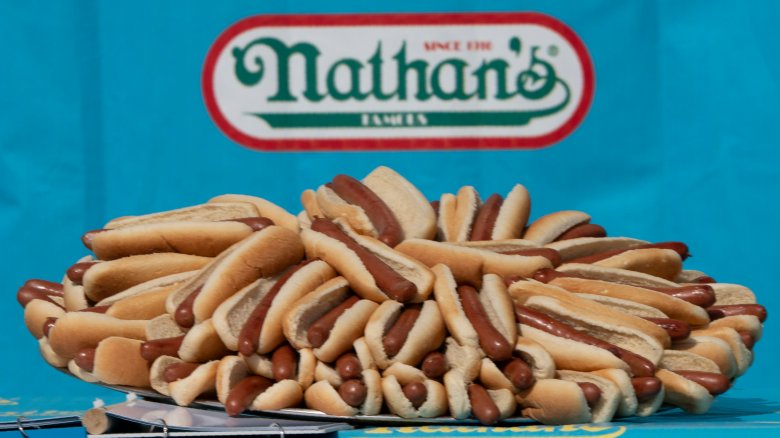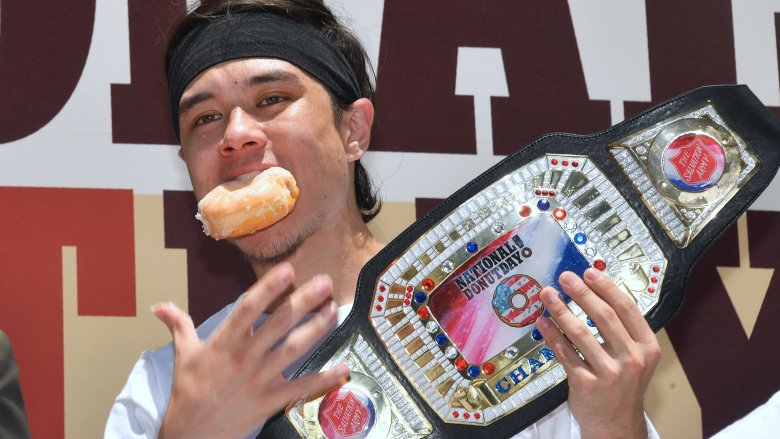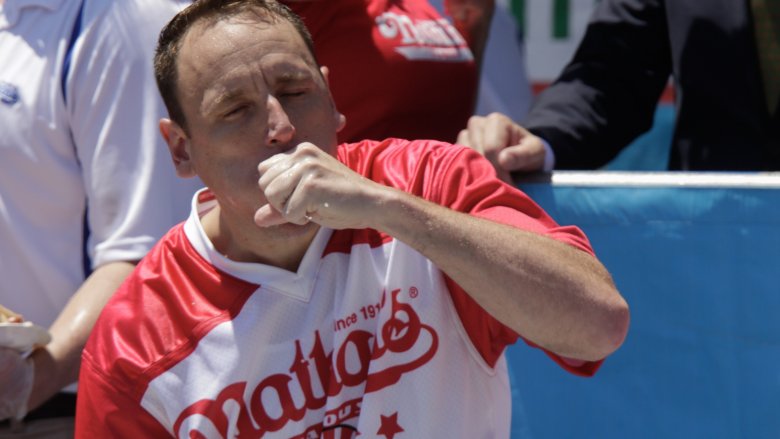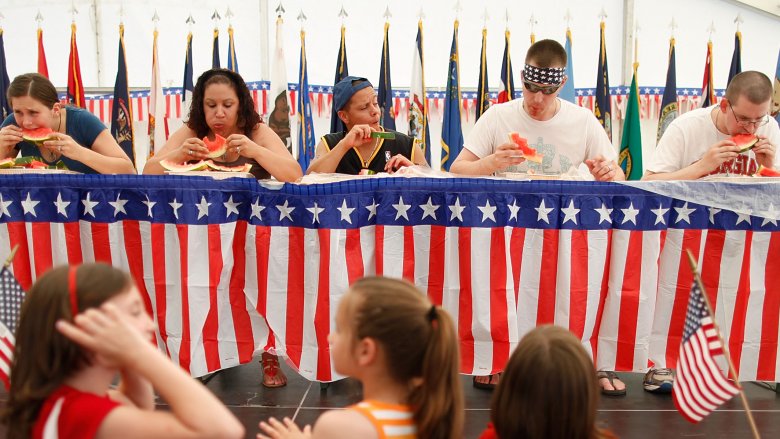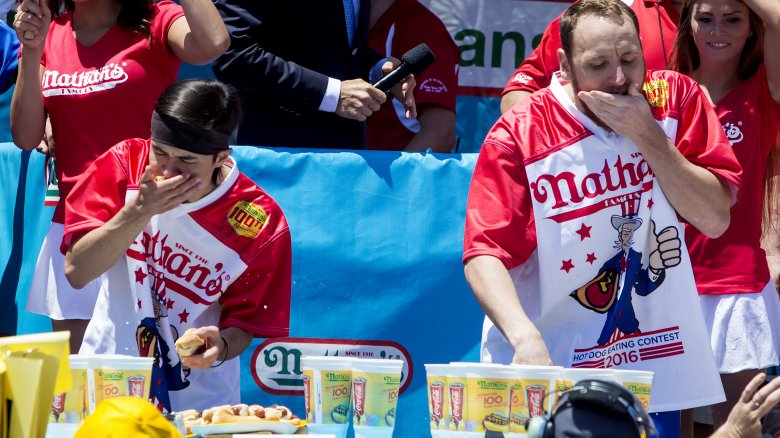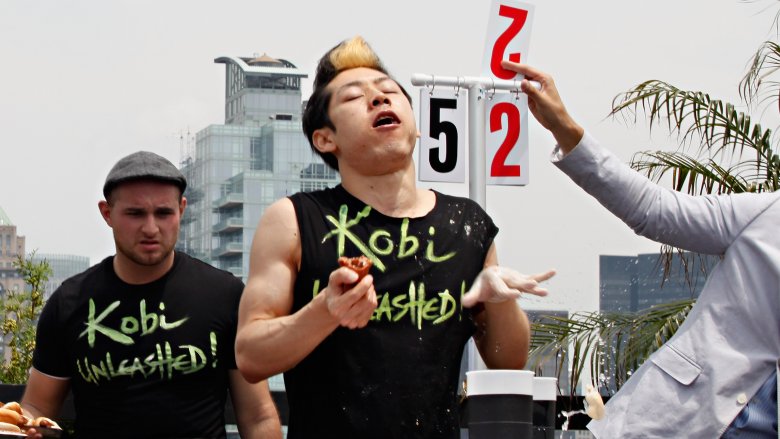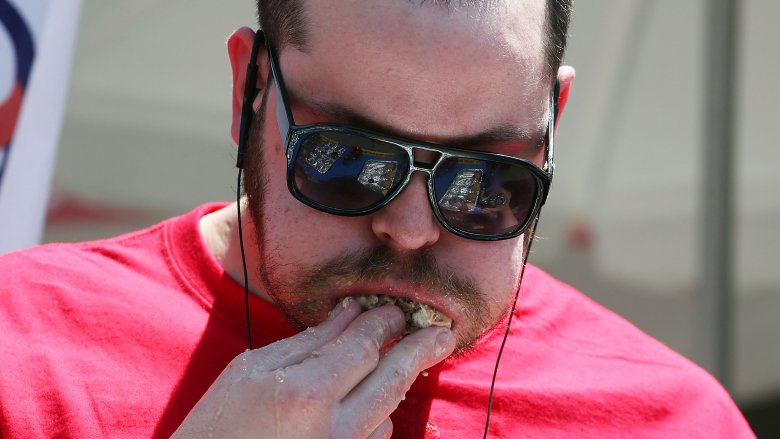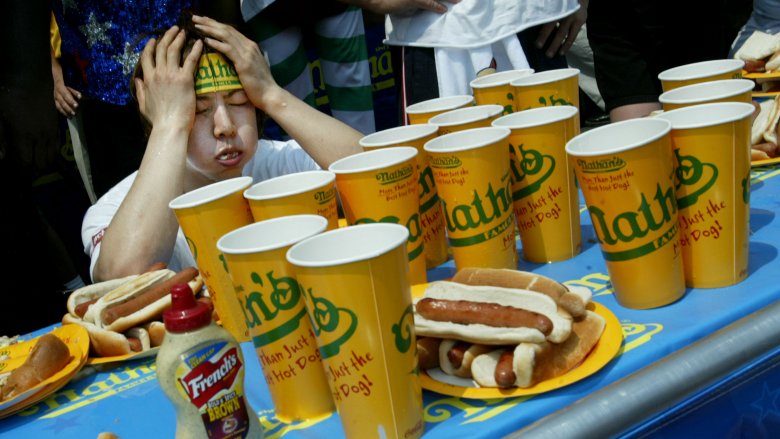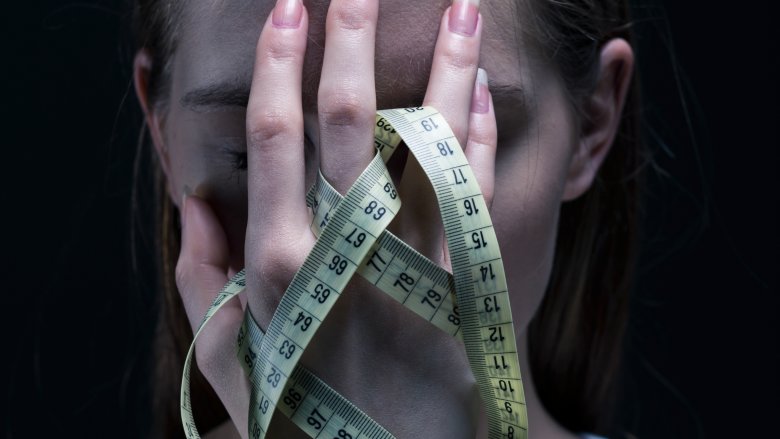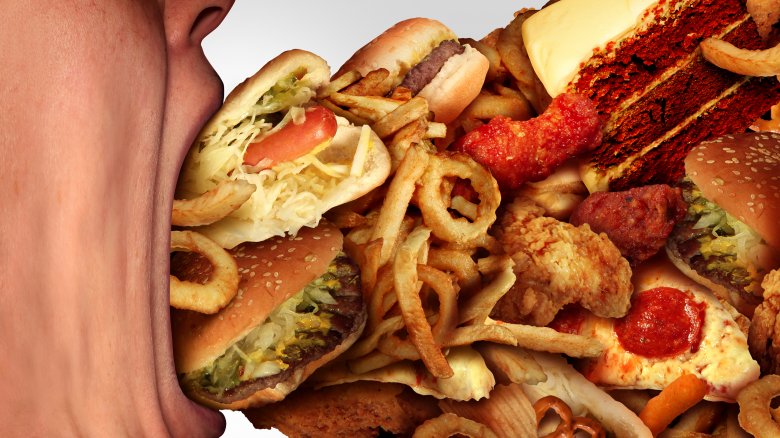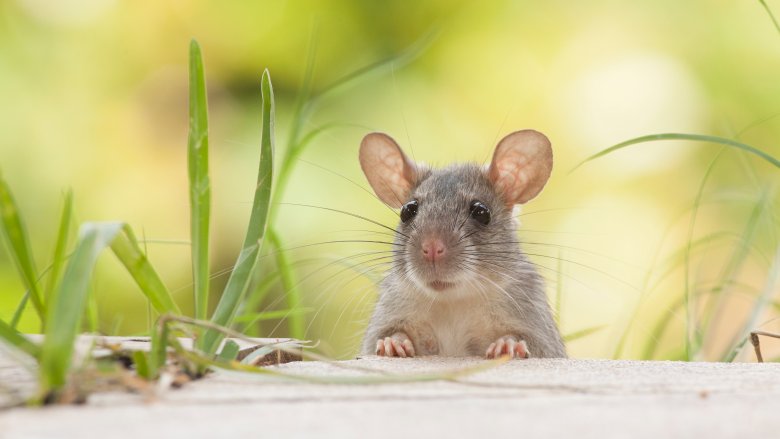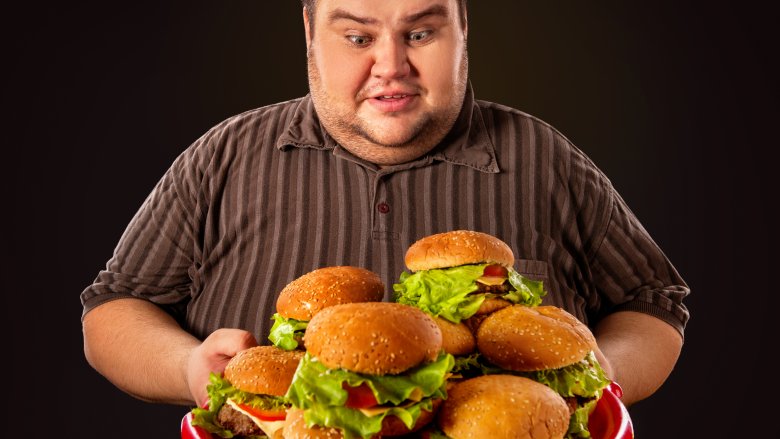The Dark Truth Of Food Eating Contests
Love them or hate them, there's a good chance you feel pretty strongly about competitive eating contests. They're taken extremely seriously by those who compete professionally, and thanks to shows like Man v. Food, the ordinary person can get involved in some serious gluttony for breakfast, lunch, dinner, and dessert.
Strangely, food eating contests are nothing new. According to Time, one of the earliest mentions goes back to Norse mythology, where Loki faced off against one of his servants in an eating contest. The servant won, only by eating the plate — and no one ever suggests you should follow in the footsteps of any Norse myth.
Officially, though, it's Nathan's Famous who's credited for really starting the whole thing in 1916, when they hosted four immigrants who wanted to prove who was the most patriotic by eating the most hot dogs. The winner was an Irishman, who scarfed down a now-modest 13 hot dogs. (Compare that to Joey Chestnut's recent 71-dog win.) There have been so many other stunts, too: there's even records in the Guinness Book of World Records for eating, because of course there are.
But there's a dark side to these eating contests, and it gets even more disturbing than you might be expecting.
Food eating contests are all experimental
There has been a lot of research done into some sports, but when it comes to competitive eating and food contests, there haven't been many studies done on what it does to a person's body.
A report published in the Canadian Medical Association Journal looked at just how little is known about what competitive eaters are actually doing to their bodies, and University of Pennsylvania professor of medicine Dr. David Metz had this to say: "The bottom line is, there is such minimal data that we are doing a lot of conjecture. [...] My concern is if they do this for years and years, this long-term chronic overeating may lead to some kind of muscular dysfunction."
"Conjecture" is not a word you want to hear when it's a doctor talking, and even professional eaters acknowledge it's probably not a good idea in the long run. Peter Czerwinski — better known as Furious Pete — has said, "I think it's stupid for anyone to do, to be frank, though I'm having fun with it."
And they're not just talking about competing, they're talking about the training sessions that lead up to it. Different eaters train in different ways, and repeat champion eater Matt Stonie (pictured) told USA Today that there are no real guidelines in place. "A lot of us don't know what we're doing. We're just experimenting. Sometimes people go a little gung-ho, a little overboard, and hurt themselves."
Choking is a real hazard at food eating contests
While long-term risks might be a little uncertain, immediate dangers often become very apparent very quickly. If you've ever tried to hurry your way through lunch and taken a few too-big bites of your burger, you know the feeling of that lump just sitting in your throat. It's not pleasant, and if you're thinking that choking might be a real danger during food eating contests, you're right.
According to a report published in the Canadian Medical Association Journal, choking is one of the biggest risks faced by anyone who enters any kind of eating contest.
Even competitive eater Randy Santel (via Food Challenges 101) — who usually goes out of his way to debunk the idea that there's anything dangerous about eating contests — says choking is a very real danger, especially for amateurs who aren't familiar with the mechanisms. They say taking large bites is a rookie mistake, and the key is small bites you can swallow without chewing... or dying.
A lot of people have died during food eating contests
It might seem like an eating contest organized by your school or town as a fundraiser or fun afternoon event would be pretty harmless, but Boston.com says there have been a lot of deaths reported as happening in just these sorts of events.
The incidents are tragic. Vice reported on the deaths of two people in a single weekend in 2017: one college student died during a pancake-eating contest, and another choked and died during a donut-eating challenge. One Australian man had a heart attack during a chili pie eating contest in 2013, the same year another man choked to death during a Romanian sausage-eating contest. No one there knew how to do the Heimlich maneuver.
The prior year, a man in Florida died after winning a bug-eating contest; he choked on roaches and vomit. A man in Taiwan passed out and died during a steam bun eating competition in 2008, and in 2007, a woman participating in a radio contest to win a Nintendo Wii drank so much water that she later died from acute water intoxication. The list continues, and it seems like it's going to keep continuing: in 2019, CNN reported that a man had died during a taco-eating contest held at a California baseball game.
Training for food eating contests is extremely dangerous
For those that make the jump from amateur to professional, it's not just about the occasional day of stuffing yourself silly. Matt Stonie (left) told USA Today that training sessions are absolutely essential for anyone who wants to win, but they can be ridiculously dangerous. Stonie prepped for Nathan's Famous hot dog eating challenge by eating around 60 hot dogs a time, three times a week for the six weeks prior to the competition, and he followed those binge sessions up by, he says, "Drinking as much water I can afterwards till, bluntly put, I feel like I'm going to explode."
And that's just not smart. Healthline says that while there are no firm guidelines for the amount of water than can be deadly, they say drinking more than 3 to 4 liters over the course of a few hours can definitely kill.
Patrick Bertoletti said as much to the AV Club, too. When they asked him about his training methods, he admitted that one of his go-to methods when he was competing was to drink an unsafe amount of liquid incredibly fast, and he added: "I would actually suggest that no one try this kind of competitive eating or try any of this training, because it can be very dangerous and stupid."
For the record, the organizers of Nathan's Famous hot dog eating contest have denounced the idea of training, calling it "ridiculous".
Food eating contest injuries are pretty terrifying
Training and competitive eating isn't just potentially deadly some of the biggest names in the industry have badly hurt themselves. When Patrick Bertoletti was asked about injuries (via USA Today), he admitted that he had hurt himself but refused to talk about just what he'd done. "I don't want to hurt the sport, I don't want to hurt my marketability, and I'm embarrassed," he said.
Others have been a little more open about what they've done. In 2007, long-time Nathan's Famous champ Takeru Kobayashi (pictured) posted (via Slate) that he had developed such bad arthritis in his jaw that he could no longer open his mouth. He was 29 years old.
Also in 2007, Don "Moses" Lerman very openly said that he had stretched his stomach so far it had caused internal bleeding. But he was far from upset about it, saying (via the Huffington Post), "I do it for the thrill of the competition. Some people are good at golf. I'm good at eating."
It's no wonder that according to Forbes, any event held by Major League Eating (MLE) requires emergency medical personnel to be on hand during the events. There's no telling what can happen. Take Moon-Pie eating champ Mort Hurst. In 1991, he had a stroke after he spent 29 second eating 38 soft-boiled eggs and even more surprisingly, he not only recovered, but returned to the sport and kept on eating.
No one's really sure what the long-term effects of food eating contests are
When Patrick Bertoletti (pictured) talked to the AV Club, they asked him if there were any physicals he needed to clear or pre-contest checks typically he needed to pass. He said no — they only needed to sign a waiver saying they won't hold anyone running the contest liable for whatever happens.
Bertoletti is skeptical of any long-term effects, but medical experts aren't so sure. There are things like obesity and diabetes, of course, but there's also much worse. Doctors from the University of Pennsylvania have published (via Time) the results of a study that found that all the training they put themselves through doesn't just expand their stomach, it allows them to override the "satiety reflex." That's the thing that tells you when you're full, makes you want to stop eating, and triggers the vomiting reflex if you've eaten too much.
They also showed a lack of "gastric peristalsis," which is the movement of the muscles in your digestive tract that help move food along and digest it.
What does that mean for a competitive eater who does it for years? No one's sure, because as Bertoletti says, "we're the first breed of eaters that [...] started taking it as a sport." But according to research published in the American Journal of Roentgenology, it's entirely possible they'll suffer lifelong consequences like uncontrollable nausea, vomiting, and even gastroparesis, which is a condition where the stomach can't empty itself.
Removal of part of the stomach might be necessary for competitive eaters
If the likely complications from years of competitive eating sound bad, the fixes are worse. According to Forbes, all that stomach-stretching they're doing is putting a serious strain on their digestive tract, and a stomach stretched that much is at a high risk of twisting around itself. Chronic problems might necessitate a partial gastrectomy, which is the surgical removal of part of the stomach.
Some of the other likely, long-term effects have treatment plans that are just as invasive. The Cleveland Clinic says gastroparesis — when the stomach fails to empty itself normally — is sometimes treated with medication and sometimes with surgery. An electrical device is implanted, and shocks are sent into the stomach muscles to control vomiting and the flow of food through the system. Other patients might need a feeding tube to be inserted, or a person might be forced to rely on what's essentially an IV drip to deliver crucial nutrients directly into the bloodstream, bypassing the stomach entirely.
Food eating contests are linked to eating disorders
According to the National Association of Anorexia Nervosa, somewhere around 30 million people in the U.S. alone suffer from some kind of eating disorder — and someone dies from their disorder every 62 minutes. It's a huge problem, and Psychology Today questioned whether or not eating contests were a type of "socially sanctioned bulimia".
And they're not the only ones to draw the comparison. Patrick Bertoletti told the AV Club, "It's like controlled bulimia. It's bulimia where you get paid for it. It's me trading on an eating disorder for money."
That is undeniably terrible, and that's only part of the story. When Men's Health talked to competitive eater Erik Lamkin, he had a different story to tell. When he was 17 years old, he was hospitalized for anorexia nervosa. When he got out of treatment, he says he knew he had to face his problems head-on, and went to Man v. Food alumni restaurant the Broken Yolk, ordered a 12-egg omelet, and never looked back.
"I was blown away," he said. "I thought I would feel all this guilt and all these voices hitting me, but instead I thought, 'Wow. I'm perfectly OK in this very moment. I might gain a little weight from this meal, but I had the time of my life.'" By the time he was 25, he had turned eating challenges into a positive experience with food, and it just goes to show that everyone approaches it differently.
Food eating contests are a horrible waste of food
Hunger is still a major problem, and Feeding America estimates that 40 million Americans go hungry. To put that in perspective, if you took the entire populations of New York City, Los Angeles, Chicago, Houston, Phoenix, and Philadelphia, you're only at about 20 million.
That's unthinkable, and when you look at the numbers, it's completely understandable that there's a lot of people who point out just how wasteful these food eating contests are. One concerned citizen wrote to The Daily Herald about Nathan's hot dog eating contests, writing,
"Consider this: At one per person, 69 hot dogs will feed 69 needy people one meal. 69 people! [...] I understand the sporting nature of eating contests. [...] But then I think about the needy/hungry man who may be sitting in the park, [...] feeling the deep rumble in his belly as he watches someone who is likely not needy, eat 69 hot dogs."
Others (via The Huffington Post) point to eating contests as a symbol of a bigger problem: America's wasteful nature. How do competitive eaters justify it? According to Randy Santel (via Food Challenges), it's not wasteful because he's capable of eating the leftovers of everyone else at the table. But... is that really the point critics are trying to make?
Some food eating contests have gotten attention for animal cruelty
Food eating contests are all about the spectacle, and if you want to get recognized, you're going to have to keep going bigger and more outlandish. But some critics say they've gone too far — especially when it crosses the line into animal cruelty.
In 2007, Esquire says Six Flags held an eating contest that was more about the yuck factor than speed or quantity, and anyone who could eat a live cockroach was given VIP passes for rides during their Fright Fest Halloween celebration. PETA got involved, and Six Flags issued a response that gets more disturbing the more you think about it: they said cockroaches weren't any different from any of the other animals they serve. Ew.
Other contests have also gotten negative attention for making contestants do things like eat the tails off live mice, chugging cups of live maggots, swallowing live frogs, and eating as many duck embryos — or balut — as possible in five minutes.
The nutritional content of what competitive eaters eat is shocking
So, here's a question: how much do you think you'll need to shove into your head to become a competitive eater? The numbers are mind-numbing, and we'll start with what Erik Lamkin told Men's Health: he once ate 100,000 calories in four days. For a normal person, that's enough food to last 50 days. That was extreme, though, and he more regularly sticks to 20,000 and 25,000-calorie challenges for ordinary days.
Here are some other numbers: Matt Stonie once downed 13,000 calories and 534 grams of fat to take on a Dunkin' Donuts challenge (via USA Today), and the whopper of a winner? Joey Chestnut (pictured) ate 20,160 calories, 1,296 grams of fat, and 56,160 mg of sodium to break the Nathan's Famous record in 2017 (with 72 hot dogs). That's 38 days' worth of sodium (based on American Heart Association guidelines), and roughly 26 days' worth of fat (via The Cleveland Clinic). There is no way that's good for anyone.
Some competitive eaters have turned to drugs and medication to win
If you're wondering whether or not there's a better way to win a food eating contest than training with thousands of calories and gallons of liquid... well, you'll have to define "better."
Since professional competitive eaters rely on changing their physiology to allow for enough room to get all that food in, appetite-enhancing substances aren't going to help too much. But there are a few things that could, in theory, give an eater the upper hand.
Some Quora users give incredibly questionable advice, including one person who admits to having used insulin to lower his blood sugar and, in turn, increase his appetite before an eating contest he won. While he says that's just for a small contest among a group of friends, Dr. Connor O'Brien of Stanford told Thrillist that there are medications that are used to give contestants an advantage by helping to override nausea, and others act to suppress the nervous system's reaction to overeating. Does any of that sound healthy? Not in the least.
